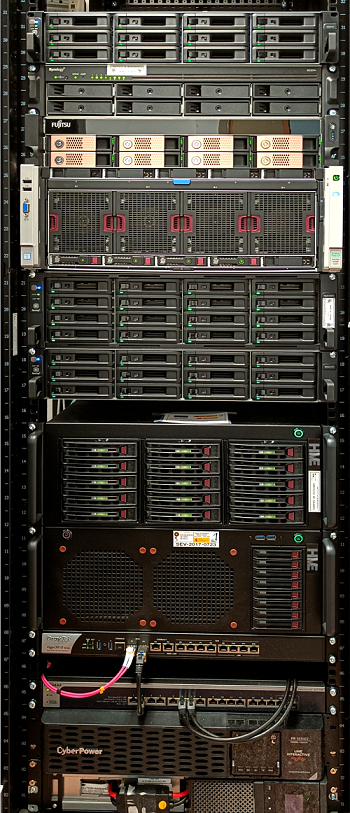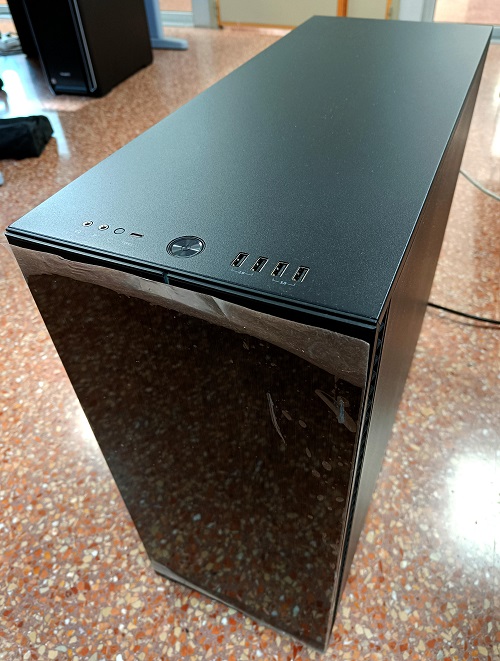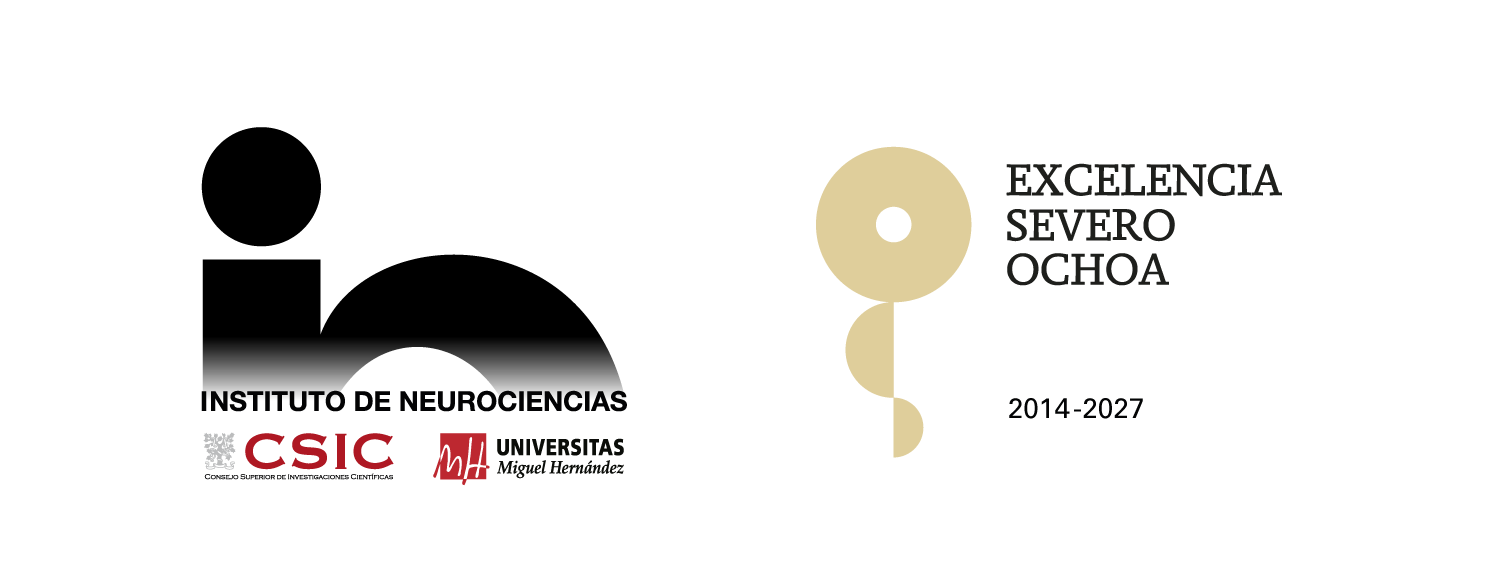
The Systems Administration and Bioinformatics Service of the Institute of Neurosciences (IN) manages the shared IT infrastructure and provides specialized technical support in bioinformatics analysis.
Our mission is to train researchers through workshops and specialized courses that enable them to master these resources. By empowering users, we aim to optimize the use of available resources and maximize their research potential, fostering significant advances in the field of neuroscience.
This service is divided into two key areas — Systems Administration and Bioinformatics — each with specific functions that complement each other to provide comprehensive support to researchers:
Bioinformatics:
- Specialized computational support: Installation, configuration, and optimization of bioinformatics software for omics data processing.
- Data analysis consulting: Guidance in experimental design, data preprocessing, and analysis, ensuring the application of appropriate methodologies and the correct interpretation of results.
- Training and resources: Organization of courses, seminars, and workshops on data analysis, best practices, and new bioinformatics tools. Development of documentation and guides to facilitate learning and the application of advanced techniques. Implementation of bioinformatics analysis pipelines tailored to the needs of research projects.
Systems Administration:
- IT infrastructure management: Administration and optimization of servers, storage, and networks, ensuring their performance, availability, and security.
- Technical support and assistance: User support in system and software use, troubleshooting, and training in IT tools.
- Security and maintenance: Implementation of security policies, data backups, and software updates to ensure data integrity and protection.
- Optimization of technological resources: Assessment of future needs, license management, and technical support for the acquisition and configuration of specialized hardware.
Photo: Systems at the UMH Data Processing Center (CPD) on the Sant Joan d’Alacant campus. Institute of Neurosciences (CSIC-UMH).
Below are the main functions of the Systems Administration and Bioinformatics Service:
- Training in bioinformatics analysis and development of learning resources:
- Conduct customized training sessions, courses, and seminars on data analysis, bioinformatics tools, and best practices in biological data management.
- Ensure that researchers stay up to date with the latest trends and technologies in omics data analysis.
- Share in-house learning resources, along with tutorials, technical documentation, and online forums, to foster an active bioinformatics community within the institute.
- Evaluate the effectiveness of training activities through surveys and feedback, adjusting programs to keep them relevant and aligned with researchers’ needs.
- Consulting in omics data analysis development:
- Collaborate with multidisciplinary teams in the planning and design of experiments involving omics analyses, maximizing technical feasibility.
- Provide guidance on best practices for handling and analyzing omics data, adapting approaches to the specific context of each project.
- Specialized computational support in bioinformatics:
- Manage the installation, configuration, and updating software for biological data processing on systems associated with the service, ensuring compatibility and optimal functionality.
- Provide specialized technical support for the use of bioinformatics tools and software, assisting in troubleshooting data processing issues.
- Collaborate with researchers to identify and evaluate new tools and technologies, promoting the integration and expansion of analytical capabilities within our systems.
- Technical assistance for the use of the systems associated with the service:
- Organize training sessions and hands-on workshops for users to improve their proficiency in IT tools and maximize productivity.
- Provide technical support to users in the operation of systems managed by the service.
- Develop clear user manuals and standard operating protocols to facilitate the efficient use of available tools and resources.
- Administration and strategic management of the shared IT infrastructure:
- Supervise, evaluate, and actively manage the shared IT infrastructure, prioritizing operational continuity and security.
- Assess and optimize the performance of servers, networks, and storage systems linked to the service.
- Implement and periodically update security policies and data backup protocols to ensure full protection of sensitive information.
- Regularly audit tools and platforms to verify compliance with usage regulations and license agreements.
- Proactively identify the institute’s current and future needs in terms of IT infrastructure, support contracts, and licenses, with the goal of promoting renewal, ensuring continuity, and driving operational expansion.
- Proactive maintenance of equipment and devices associated with the service:
- Implement a structured preventive and corrective maintenance program for the service’s equipment to ensure optimal operation and extend their lifespan.
- Establish a periodic review process for all equipment, including performance assessments and condition checks to detect issues and identify potential improvements.
- Incorporate active remote monitoring and management tools to enable real-time tracking of performance and status, and to support decision-making regarding equipment replacement or upgrades.
- Supervise the acquisition, installation, and configuration of specialized hardware, such as new servers and workstations for the service.
- Maintain an accessible, up-to-date digital inventory of all devices and equipment, including information about users and access credentials, to ensure system availability and easy access when required.
The use of the resources and services of the Systems Administration and Bioinformatics Service at the Institute of Neurosciences (CSIC-UMH) is subject to the following rules. All users must be aware of and comply with them to ensure safe, efficient, and lawful use of these resources.
- Communication and Responsibility:
- All inquiries, access requests, training registrations, or incident reports must be sent by email to: bioinformatics@umh.es.
- The Principal Investigator (PI) of each group is responsible for ensuring the proper use of the service’s resources and services by the members of their laboratory.
- Access to servers, storage systems, or training requires prior authorization from the service.
- Service users must be affiliated with the Institute of Neurosciences or officially conducting a research stay there.
- Security and Access:
- Each user must use only their personal account. Sharing accounts or credentials is strictly prohibited.
- Passwords must be secure and unique; they must not be shared or reused.
- Access to the service’s servers is restricted to authorized and registered users, following formal requests and approval by the service.
- Modifying, copying, or manipulating resources, configurations, or data without explicit permission is forbidden.
- Any security incident or suspicion of misuse must be reported immediately to the Systems Administration and Bioinformatics Service at bioinformatics@umh.es.
- Use of Computational Resources:
- The service’s servers are intended exclusively for data analysis and research activities conducted at the Institute of Neurosciences.
- Storing personal files or non-scientific data unrelated to approved research projects is not permitted.
- Software installation or configuration changes must be performed or approved by the service’s technical staff.
- Processes that overload computational resources or affect system performance may be terminated without prior notice.
- To use specific servers such as NeuroServer or MRIServer, access must be requested via bioinformatics@umh.es, with the PI of the group in copy.
- Data Storage and Management:
- Storage space on the servers must be used exclusively for research data.
- Users are advised to maintain backups of critical data on external devices or alternative storage solutions.
- Overloading systems with unnecessary data or keeping obsolete files without purpose is not allowed.
- Data may be deleted during maintenance or periodic clean-ups after prior notification.
- Software Use and Licensing:
- Users must respect all software license agreements for programs installed on the service’s servers.
- Software use is limited to scientific research activities approved by the Institute of Neurosciences.
- Running processes that degrade overall system performance or monopolize resources without justification is prohibited.
- Any software installation request must be sent to bioinformatics@umh.es and include a justification for its use and technical requirements.
- Bioinformatics Training:
- Each training session will start promptly at the scheduled time:
- In case of inability to attend, participants must notify bioinformatics@umh.es at least 5 business days in advance, specifying the reason.
- Last-minute cancellations (less than 5 days in advance) will only be accepted for force majeure reasons, which must be documented if requested by the service.
- Two or more absences or repeated unexcused delays of more than 10 minutes within six months will result in a two-month suspension from registering for new training activities.
- In cases of force majeure, users may submit a written justification to bioinformatics@umh.es within 5 business days after the session to avoid penalties.
– If a participant arrives more than 10 minutes late, the session will begin without waiting.
– If the delay exceeds 30 minutes, it will be considered an absence, and the participant will not be allowed to join the session.
- Consulting on Omics Data Analysis:
- The service provides technical consulting and troubleshooting sessions related to training content, data analysis, and experimental design. These sessions are held on Fridays, upon prior request sent to bioinformatics@umh.es at least 3 business days in advance, specifying the topic to be discussed.
- Consultations must be specific, well-defined, and directly related to training sessions or approved research projects.
- General or unfocused questions will not be addressed, to respect the time and preparation of technical staff.
- Requests will be attended to in order of receipt, subject to the service’s availability.
- Requests that do not meet these criteria may be postponed or rejected, giving priority to those showing adequate preparation by the user.
- Acknowledgment in Scientific Output:
- Any publication, presentation, or work derived from the use of the service’s resources or consulting must include the following acknowledgment:
- The service may request users to provide an activity or results report for inclusion in its annual summary.
“Bioinformatics analyses were carried out with the support of the Systems Administration and Bioinformatics Service of the Institute of Neurosciences CSIC-UMH.”
- Sanctions and Corrective Measures:
- Any misuse or violation of these rules may result in temporary or permanent suspension of access to the service’s resources.
- In severe cases of fraudulent, negligent, or malicious use, additional disciplinary actions may be taken in accordance with the regulations of the Institute of Neurosciences, CSIC, and UMH.
The shared computing infrastructure comprises various high-performance systems for data storage and processing, featuring pre-installed specialized software. This infrastructure includes three high-performance servers — NeuroServer for omics data analysis, MRIServer for magnetic resonance imaging (MRI) processing, and Acquifer HIVE for microscopy image analysis — along with five dedicated training and analysis workstations. These systems are strategically distributed between the Institute of Neurosciences (IN) and the Data Processing Center (CPD) to optimize data access and management in multi-user environments.
Below are the technical specifications of the main systems:
- NeuroServer (Omics Data Processing System):
- CPU: 4× Intel Xeon E7-8870 v4, totaling 80 cores (160 threads) at 2.10 GHz with 200 MB L3 cache.
- RAM: 2 TB DDR4 ECC registered memory at 2400 MHz (operating at 1600 MHz).
- Storage: 40 TB SATA3 SSD configured in RAID 5 (10 × 4 TB SSDs).
- NAS Storage: 22.6 TB usable, with 8 × 6 TB SATA3 HDDs in RAID 6 plus 1 spare disk.
- MRIServer (Magnetic Resonance Imaging Analysis Server):
- CPU: AMD Epyc 9474F, 48 cores (96 threads) at 3.60 GHz with 256 MB L3 cache.
- RAM: 768 GB DDR5 ECC registered memory at 4800 MHz.
- GPU: Nvidia RTX A6000 with 48 GB GDDR6 memory.
- Storage: 20 TB NVMe SSD.
- Acquifer HIVE (Microscopy Image Analysis Server):
- CPU: Intel Xeon Platinum 8280, 28 cores (56 threads) at 2.70 GHz with 28.5 MB L3 cache.
- RAM: 1 TB DDR4 registered memory at 3200 MHz.
- GPU: Nvidia RTX 5000 with 48 GB GDDR6 memory.
- Storage: 10 TB NVMe SSD.
- NAS Storage: 78 TB usable, with 15 × 6 TB SATA3 HDDs in RAID 6.
- Analysis Workstations (5 units):
- CPU: Intel Core i5-13400, 10 cores (16 threads) at 2.50 GHz with 20 MB L3 cache.
- RAM: 64 GB DDR4 memory at 3200 MHz.
- GPU: Nvidia RTX 3050 with 6 GB GDDR6 memory.
- Storage: 500 GB NVMe SSD and 4 TB SATA3 HDD.
This infrastructure provides a robust and efficient foundation for scientific data processing and analysis, optimizing performance and supporting high-level research at our institute.


Photos: Systems managed by the Systems Administration and Bioinformatics Service. Institute of Neurosciences (CSIC-UMH).
General communications, inquiries, and requests should preferably be sent by email to: bioinformatics@umh.es
Technical Manager – Systems Administration Area:
Ángel Márquez Galera
Phone: +34 965 91 92 56
Email: a.marquez@umh.es
Technical Manager – Bioinformatics Area:
Carmen Gómez-Escolar Arias
Phone: +34 965 91 92 56
Email: carmen.gomeze@umh.es
Scientific Coordinator:
José Pascual López-Atalaya
Phone: +34 965 23 37 44
Email: jose.lopez@umh.es
Systems Administration and Bioinformatics
Ground floor – Office 018,right wing – Rooms S08P0003 and S08P0004
Institute of Neurosciences, Universidad Miguel Hernández–CSIC
Campus de San Juan, Sant Joan d’Alacant, Alicante | España
Tel. + 34 965 23 37 00 (Service ext. 9256)
Workstations managed by the Service can be booked through the intranet of the Institute of Neurosciences:
https://in.umh-csic.es/es/intranet/
Training requests in bioinformatics should be submitted by completing the following online form:
If you wish to suggest improvements, propose new training sessions, or share any comments about the service, you can do so through the following suggestions box:
Access the updated training materials and resources managed by the Systems Administration and Bioinformatics Service.
https://drive.google.com/drive/folders/1zINBG6F4wYCdWPLmCEuL0AxNYepUqZD4?usp=sharing
Access is restricted to users with active UMH identification.

 Español
Español